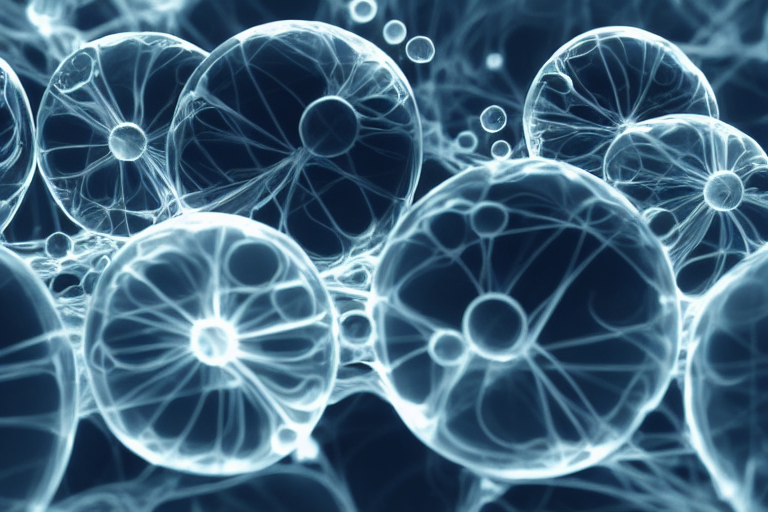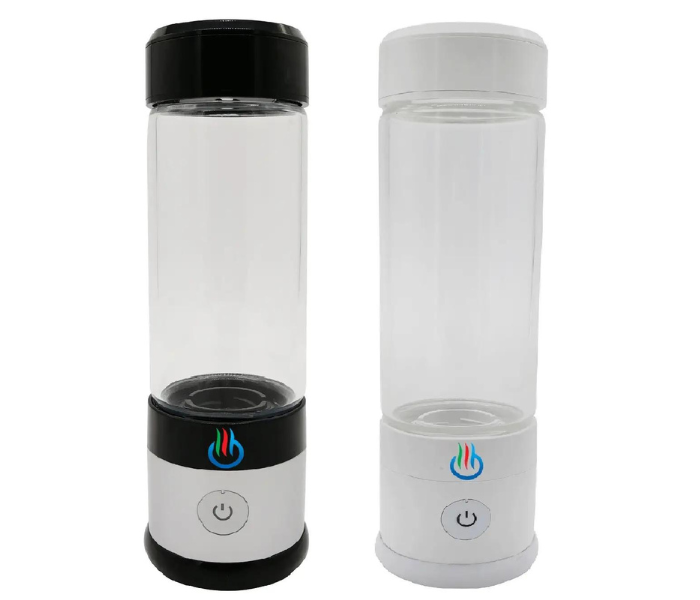What is H3o water?

H3O, or the hydronium ion, is a positively charged ion formed when a water molecule gains an extra hydrogen ion. It is a significant species in both chemistry and health.
The hydronium ion is central to acid-base chemistry and many biochemical processes. Hydrating with H3O helps maintain skin health, nutrient absorption, athletic performance, and recovery.
H3o: Key Takeaways
- Hydronium is a positively charged ion formed when a water molecule gains an extra hydrogen ion.
- The hydronium ion is central to acid-base chemistry and many biochemical processes.
- H3O hydration is essential for maintaining good health and well-being.
- Strong acids are acids that dissociate entirely in water, forming hydronium ions. Weak acids only partially dissociate in water, forming hydronium ions.
- Scientific research has provided many insights into the role of the hydronium ion in chemistry and health. Future research will likely focus on its role in specific diseases and on developing new hydronium ion therapies.
Hydronium Ion

Definition and Overview of H3O
The hydronium ion is a positively charged ion with the chemical formula H3O+. It forms when a water molecule gains an extra hydrogen ion.
This can happen when an acid dissolves in water or when water undergoes autoionization, a process by which water molecules spontaneously split into hydronium and hydroxide ions.+
Also read >>> Cellpower Hydrogen Water Bottle
Structure and Properties
The hydronium ion is a tetrahedral molecule, with the hydrogen atom at the center and the three oxygen atoms surrounding it – the hydrogen atom bonds to the three oxygen atoms by covalent bonds.
The hydronium ion is a strong acid responsible for the acidic properties of aqueous solutions.
Formation and Stability
Hydronium ions form when water molecules gain an extra hydrogen ion, which can happen when an acid dissolves in water or undergoes autoionization.
Several factors influence the hydronium ion’s stability, including the solution’s temperature and pH. It is more stable in acidic solutions and less stable in basic solutions.
Role in Acid-Base Chemistry
The hydronium ion plays a central role in acid-base chemistry. Acids are substances that donate protons (H+) to water, forming hydronium ions. Bases are substances that accept protons from water, forming hydroxide ions (OH-).
When an acid dissolves in water, it donates a proton to a water molecule, forming hydronium ions. The strength of an acid is determined by how easily it donates a proton to water.
The hydronium ion also plays a vital role in neutralizing acids and bases. When a base neutralizes an acid, the proton from the acid is transferred to the base, forming water.
Some specific examples of the role of H3O in acid-base chemistry include:
- Catalysis: The hydronium ion can act as a catalyst for many chemical reactions. For example, the hydronium ion catalyzes the hydrolysis of esters, breaking down fats and oils.
- Acid-base indicators: Acid-base indicators are substances that change color depending on the pH of the solution. The hydronium ion plays a role in the color change of acid-base indicators.
- Titrations: Titrations are a type of analysis used to determine the concentration of an acid or base. The hydronium ion plays a role in the neutralization reaction that occurs during titration.
Also read >>> Hydrogen Water
Free Hydrogen ions do not Exist in Water
Hydrogen Ion in Aqueous Solutions
In aqueous solutions, there are far more water molecules than hydrogen ions. As a result, a bare hydrogen ion cannot exist in water. Instead, the hydrogen ion in aqueous solution is a proton, a bare nucleus.
Although it carries only a single unit of positive charge, this charge is concentrated into a very small volume, about a hundred-millionth the size of the smallest atom.
This produces an extraordinarily high charge density, strongly attracting the proton to any nearby atom or molecule with an excess negative charge. In the case of water, this is the lone pair (unshared) electrons on the oxygen atom.
The tiny proton will bury itself within the lone pair and form a shared-electron (coordinate) bond, creating a hydronium ion.
In simpler terms:
In water, there are many more water molecules than hydrogen ions. Water molecules comprise two hydrogen atoms and one oxygen atom, while hydrogen ions are just single hydrogen atoms.
As a result of this imbalance, hydrogen ions cannot exist on their own in water. Instead, they combine with water molecules to form hydronium ions.
Acids and Bases in Aqueous Solutions
Understanding Acids and Bases
Acids and bases are two important classes of chemicals. Acids are substances that donate protons (H+) to water, forming hydronium ions.
Bases are substances that accept protons from water, forming hydroxide ions. The pH of a solution is a measure of the concentration of hydronium ions in the solution. A pH of 7 is neutral, while a pH below 7 is acidic, and above 7 is basic.
The Role of the Hydronium Ion
The hydronium ion plays a central role in acid-base chemistry. Acids are substances that donate protons (H+) to water, forming hydronium ions.
Bases are substances that accept protons from water, forming hydroxide ions. The pH of a solution is a measure of the concentration of hydronium ions in the solution.
Strong and Weak Acid Solutions
Strong acids are acids that dissociate entirely in water, forming hydronium ions. Weak acids only partially dissociate in water, forming hydronium ions. The following are examples of strong acids:
- Hydrochloric acid (HCl)
- Nitric acid (HNO3)
- Sulfuric acid (H2SO4)
The following are examples of weak acids:
- Acetic acid (CH3COOH)
- Citric acid (C6H8O7)
- Phosphoric acid (H3PO4)
Strong acids typically have a pH below 2, while weak acids usually have a pH between 2 and 7.
Health Benefits of H3O Hydration
Overview of H3O Hydration
H3O hydration is the process of consuming fluids that contain the hydronium ion, such as:
Water: Water is the best source of H3O. It is pure and contains no other substances that could interfere with hydration.
Coconut water: Coconut water is a natural electrolyte drink high in H3O. It is a good choice for people looking for a healthy and refreshing way to stay hydrated.
Other fluids: Tea and coffee, can also help to hydrate the body and provide H3O. However, avoiding sugary drinks, such as soda and juice, is crucial as they can dehydrate the body.
Fruits and vegetables: Fruits and vegetables are high in water content, so eating them can help you stay hydrated and get your H3O intake.
Sports drinks: Sports drinks contain electrolytes, which are minerals that are essential for muscle function, fluid balance, and nerve function. Sports drinks can be an excellent way to replenish electrolytes and H3O after a workout or hot day.

Improved cognitive function
Studies have shown that H3O hydration can improve cognitive function, such as memory and attention. This is likely because H3O hydration helps to improve the delivery of nutrients and oxygen to the brain.
One study found that students who were well-hydrated performed better on cognitive tests than students who were dehydrated. Another study found that older adults who were well-hydrated had better memory and attention than those who were dehydrated.
H3O hydration is also vital for producing neurotransmitters, which are chemicals that allow brain cells to communicate with each other. Neurotransmitters are involved in all aspects of cognitive function, including memory, attention, learning, and mood.
Reduced risk of chronic diseases
Studies have shown that H3O hydration can reduce the risk of chronic diseases because H3O hydration helps to regulate blood pressure, blood sugar levels, and cholesterol levels.
One study found that well-hydrated people had a lower risk of developing heart disease than dehydrated people. Another study found that well-hydrated people had a lower risk of developing stroke than dehydrated people.
H3O hydration is also important for kidney function. The kidneys help to filter waste products from the blood and remove them from the body. When the body is dehydrated, the kidneys have to work harder, which can lead to kidney stones and other kidney problems.
Improved athletic performance and recovery
H3O hydration is beneficial for athletic performance and recovery. Properly hydrated athletes can exercise for extended periods and recover quickly from their workouts. H3O hydration can also help to reduce the risk of muscle cramps and other injuries.
One study found that well-hydrated athletes were able to run faster and longer than dehydrated athletes. Another study found that well-hydrated athletes recovered more quickly from muscle damage than dehydrated athletes.
H3O hydration also helps regulate body temperature. When the body is dehydrated, it is more difficult to regulate body temperature, which can lead to heat exhaustion and heat stroke.
Healthier skin

H3O hydration is essential for maintaining healthy skin. When the skin is hydrated, it is more elastic and less prone to wrinkles and dryness.
One study found that well-hydrated people had more elastic skin and fewer wrinkles and fine lines than dehydrated people.
H3O can benefit skin health because it helps to remove toxins from the body. When the body is dehydrated, toxins can build up in the skin, leading to breakouts and other skin problems.
Better nutrient absorption
H3O hydration is necessary for proper nutrient absorption. When dehydrated, the body cannot transport nutrients efficiently to the cells. This can lead to various health problems, including fatigue, muscle cramps, and headaches.
One study found that well-hydrated people absorbed more nutrients from their food than dehydrated people. Another study found that well-hydrated people had better muscle function than dehydrated people.
H3O hydration also helps the body absorb electrolytes, minerals essential for muscle function, fluid balance, and nerve function. You can lose electrolytes through sweat, so replenishing them by drinking fluids that contain electrolytes, such as sports drinks or coconut water, can be beneficial.
Additional benefits of H3O hydration
In addition to the general health benefits listed above, H3O hydration has also shown to be beneficial for many specific conditions, including:
- Migraines: Studies have shown that H3O hydration can help to reduce the frequency and severity of migraines.
- Kidney stones: H3O hydration can help prevent kidney stones’ formation.
- Urinary tract infections: H3O hydration can help flush out bacteria from the urinary tract and reduce the risk of urinary tract infections.
- Constipation: H3O hydration can help to soften stool and relieve constipation.
- Hangover symptoms: H3O hydration can help to relieve hangover symptoms such as headache, nausea, and fatigue.
Scientific Studies and Research

Exploration of Hydronium Ion in Earth and Planetary Sciences
Cloud formation and rain: The hydronium ion plays a role in the formation of clouds and precipitation by condensing water vapor. When water vapor in the atmosphere cools, it condenses into liquid water droplets. The hydronium ion can act as a nucleation site for cloud droplets, which can help initiate condensation.
Weathering of rocks and minerals:
The hydronium ion also weather rocks and minerals, broken down and eroded. The hydronium ion can dissolve some rocks and minerals and contributes to the chemical weathering of rocks and minerals.
In addition, the hydronium ion is also part of many other Earth and planetary processes, such as:
- Hydrothermal circulation: Hydrothermal circulation is the movement of hot water and steam through the Earth’s crust. The hydronium ion plays a role in hydrothermal circulation by helping to dissolve minerals and transport them through the Earth’s crust.
- Volcanic eruptions: Volcanic eruptions can release many hydronium ions into the atmosphere, leading to acid rain, which damages plants, animals, and infrastructure.
- Planetary atmospheres: The hydronium ion is also present in the atmospheres of some planets, such as Mars and Venus. The hydronium ion can play a role in forming clouds and precipitation on these planets.
Insights from Scientific Research and Studies
Scientific research has provided many insights into the role of the hydronium ion in chemistry and health. For example, researchers have discovered that the hydronium ion is essential for the function of many enzymes and proteins. They have also shown that H3O hydration can improve cognitive function and reduce the risk of certain chronic diseases.
Here are some specific examples of insights from scientific research and studies on the hydronium ion:
- Hydronium ion is essential for enzyme function: Many enzymes, which are proteins that catalyze biochemical reactions, require the presence of these ions to function correctly, such as the enzyme ATPase, the cell’s energy currency.
- Hydronium ion is important for protein structure: Hydronium ions stabilize the structure of many proteins. For example, collagen, the main component of connective tissue, requires this to maintain its structure.
- H3O hydration improves cognitive function: Studies have shown that H3O hydration can enhance cognitive function, such as memory and attention. This is likely because H3O hydration helps to improve the delivery of nutrients and oxygen to the brain.
- H3O hydration reduces the risk of chronic diseases: Studies have shown that H3O hydration can reduce the risk of certain chronic conditions, such as heart disease, stroke, and type 2 diabetes. H3O hydration helps regulate blood pressure, blood sugar, and cholesterol levels.
In addition to these specific insights, scientific research has provided a more general understanding of the role of the hydronium ion in chemistry and biology.
For example, researchers have learned that the hydronium ion is a very important species in acid-base chemistry and plays a role in many different biochemical processes.
Overall, scientific research has provided many valuable insights into the role of the hydronium ion in chemistry and health. This research has helped us better understand how the hydronium ion works and how it can improve our health and well-being.
Implications for Future Research

Future research on the hydronium ion will likely focus on its role in specific diseases and on developing new therapies that target the hydronium ion.
For example, researchers are interested in developing new drugs that can help improve the function of enzymes that require hydronium ions or stabilize the structure of proteins that stabilize.
Researchers are also interested in developing new ways to use H3O hydration to improve cognitive function and reduce the risk of chronic diseases.
The hydronium ion is a fascinating and important molecule. It plays a central role in many chemical and biological processes and is essential for good health and well-being. Scientific research on the hydronium ion is ongoing, and discoveries are constant.
Conclusion
The hydronium ion is a fascinating and important molecule. It plays a central role in many chemical and biological processes and is essential for good health and well-being. Scientific research on the hydronium ion is ongoing, and discoveries are constant.



